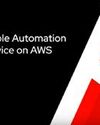
Containerisation is a technology that has been gaining popularity in recent years due to its ability to make applications portable, scalable, and easily deployable. Containers provide a lightweight and flexible way to package and distribute software applications; they help to build once and deploy anywhere by encapsulating an application and its dependencies in a container that can run on any host operating system with the same results. Containers are isolated from each other and the host operating system, providing a secure environment for running applications.
Cloud containerisation has further enhanced the advantages of containerisation by enabling users to host their containers on cloud platforms like AWS, Google Cloud Platform, and Microsoft Azure Container orchestrators such as Kubernetes and cloud-managed implementations like EKS, AKS, GKE, and AWS ROSA automate the deployment as well as auto scaling of containers and their dependencies.
Batch jobs
Batch jobs are computer programs processed in groups, which are used for long-running tasks that can be executed at a later time. They can be made to run on specific schedules such as daily, weekly, or fortnightly, using scheduled tasks in Windows or Cron jobs in Linux and UNIX systems.
While Linux Cron jobs are suitable for basic job scheduling needs, they may not be adequate for more complex or mission-critical workloads. Leveraging this gap, many enterprise job scheduling tools have emerged and gained traction, offering advanced job scheduling features like complex jobs and workflows.
Control-M is a workload automation platform that is being adopted widely as it helps organisations manage their workloads across hybrid environments from a single interface.
Diese Geschichte stammt aus der May 2023-Ausgabe von Open Source For You.
Starten Sie Ihre 7-tägige kostenlose Testversion von Magzter GOLD, um auf Tausende kuratierte Premium-Storys sowie über 8.000 Zeitschriften und Zeitungen zuzugreifen.
Bereits Abonnent ? Anmelden
Diese Geschichte stammt aus der May 2023-Ausgabe von Open Source For You.
Starten Sie Ihre 7-tägige kostenlose Testversion von Magzter GOLD, um auf Tausende kuratierte Premium-Storys sowie über 8.000 Zeitschriften und Zeitungen zuzugreifen.
Bereits Abonnent? Anmelden

Linux Foundation launches LF India to foster open source innovation and support in India
The Linux Foundation, a nonprofit organisation dedicated to driving innovation through open source, has announced the launch of LF India.

Red Hat launches Ansible Automation Platform Service on AWS
Red Hat, Inc., has announced the general availability of the Red Hat Ansible Automation Platform Service on Amazon Web Services (AWS) as a managed offering available through AWS Marketplace.

Fedora Asahi Remix 41 is now generally available
The Fedora and Asahi Linux projects have announced the general availability of Fedora Asahi Remix 41, the latest version of this distribution tailored for Apple Silicon Macs.

SageMath: A Second Glance at Cybersecurity
The eighth article in the series on SageMath explores a classical encryption scheme called the Rail Fence cipher and introduces the concept of symmetric-key encryption.

Building Cross-Platform Mobile Apps with lonic
Mobile apps are an intrinsic part of daily life today we use them to order food, groceries, taxis, and more. As these apps need to work across platforms, developers are focusing on cross-platform app development so that they code only once to create apps that function on multiple platforms. lonic is a framework that can help developers build apps faster than with native app development, while saving them time and money. Let’s learn how to install and deploy it.

Open Source AI Frameworks: Integrating AI with lot
Open source Al helps loT devices learn, adapt, and automate actions based on real-time data, improving convenience and security. Here’s an overview of six key open source Al frameworks that help integrate Al with loT, and the challenges they face.

Open Source loT: A Primer for Everyone
Open source IoT platforms promise to play a central role in shaping the future, making it possible for more people and businesses to benefit from smarter, more efficient solutions. We look at a brief history of this tech and explore emerging trends.

Using Open Source and Blockchain to Build Decentralised loT Networks
Explore how blockchain is being integrated with loT to create decentralised networks. Find out how leading open source projects like IOTA and Streamr use blockchain to ensure data integrity, security, and privacy in loT ecosystems.

Internet of Things: Running Language Models on Edge Devices
Let’s delve into the technical aspects, challenges, and benefits of deploying language models on edge/loT devices.

How Open Source is Making Quantum Computing Accessible to Everyone
Open source initiatives are breaking down the barriers to quantum computing, making it accessible to everyone. Explore what quantum computing is, the challenges of traditional adoption, how open source platforms are democratising the technology, and how you can get started in this exciting domain.